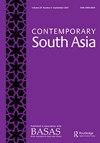印度文化和创意产业政策:通过数字政策进行监管的问题
IF 0.8
3区 社会学
Q3 AREA STUDIES
引用次数: 1
摘要
摘要本文探讨了在印度建设数字国家的背景下,文化创意产业公共政策的演变。数字产业在国家建设中的崛起是如何渗透到与文化产业相关的政策中的,这一趋势的后果是什么?它还将探讨在文化越来越与国家认同联系在一起的更广泛背景下,国家在塑造和监管此类行业方面的作用演变的紧张关系。本文首先表明,在文化政策仍然以遗产为中心的背景下,国家对文化的支持仍然有限,无论是在财政方面,还是在实施需要保护的特定法规方面,都需要免受传统市场力量的影响。然后,它分析了作为数字印度政府倡议的一部分制定的几个行动计划,并评估了文化和创意产业的新问题,这些问题与数字设备和运营商的运作越来越密切。最后,它讨论了最近通过将文化运营商的角色转移到数字平台以及试图控制表达来进行国家干预的方式。本文章由计算机程序翻译,如有差异,请以英文原文为准。
Policy for cultural and creative industries in India: the issue of regulation through digital policy
ABSTRACT This article examines the evolution of public policy for cultural and creative industries in the context of building India as a digital nation. How has the rise of digital industries in the building of the country permeated policies related to cultural industries, and what have been the consequences of this trend? It will also explore the tensions regarding the evolution of the role of the State in shaping and regulating such industries in the broader context of culture being increasingly associated with national identity. This article starts by showing that in a context where cultural policies remain centered on heritage, the support to culture by the state has remained limited, both in financial terms as well as regarding the implementation of specific regulations which would require protection from traditional market forces. Then, it analyzes several action plans that have been developed as part of the Digital India government initiative and assesses emerging issues for the cultural and creative industries, which are increasingly associated with the functioning of digital devices and operators. Finally, it discussed recent modalities of state intervention through the transfer of the role of cultural operator to digital platforms and the attempts to control expressions.
求助全文
通过发布文献求助,成功后即可免费获取论文全文。
去求助
来源期刊

Contemporary South Asia
AREA STUDIES-
CiteScore
2.10
自引率
0.00%
发文量
82
期刊介绍:
The countries of South Asia - Bangladesh, Bhutan, India, Maldives, Nepal, Pakistan and Sri Lanka - are internally diverse and part of global flows of people, goods and ideas. Contemporary South Asia seeks to address the issues of the region by presenting research and analysis which is both cross-regional and multi-disciplinary. The journal encourages the development of new perspectives on the study of South Asia from across the arts and social sciences disciplines. We also welcome contributions to pan-regional and inter-disciplinary analysis. Our aim is to create a vibrant research space to explore the multidimensional issues of concern to scholars working on South Asia and South Asian diasporas in the postcolonial era.
 求助内容:
求助内容: 应助结果提醒方式:
应助结果提醒方式:


